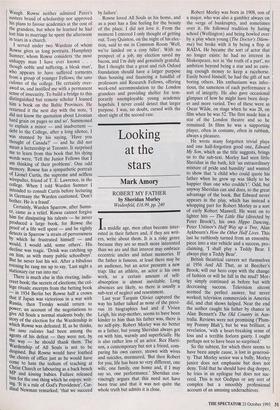Looking at the stars
Mark Amory
ROBERT MY FATHER by Sheridan Morley Weidenfeld, £16.99, pp. 240 middle age, men often become inter- ested in their fathers and, if they are writ- ers, write about them. It is a risky genre because they are so much more interested than we are and that interest may embrace eccentric uncles and infant memories. If the father is famous, at least there may be an audience, but an actor presents a new trap: like an athlete, an actor is his own work, so a certain amount of self- absorption is almost inevitable. Long absences are likely, so there is usually a sub-text of neglect and resentment. Last year Tarquin Olivier captured the way his father talked as none of the previ- ous 16 biographies had and if Vivien Leigh, his step-mother, seems to have been kinder to him than his father was, there is no self-pity. Robert Morley was no better as a father, but young Sheridan always got on with him, warmly and superficially. He is also rather less of an actor. Rex Harri- son, a contemporary but not a friend, com- paring his own career, strewn with wives and suicides, murmured, 'But then Robert for you, life has been so very different, one wife, one family, one home and, if I may say so, one performance.' Sheridan con- vincingly argues that this need not have been true and that it was not quite the whole truth but admits it is close. Robert Morley was born in 1908, son of a major, who was also a gambler always on the verge of bankruptcy, and sometimes over it. He followed tradition by hating school (Wellington) and being bowled over by a play when young (The Doctor's Dilem- ma) but broke with it by being a flop at RADA. He became the sort of actor that no longer exists: he had no interest in Shakespeare, nor in 'the truth of a part', no ambition beyond being a star and so earn- ing enough money to keep a racehorse. Easily bored himself, he had the gift of not boring others. His enthusiasm was infec- tious, the sameness of each performance a sort of integrity. He also gave occasional glimpses of how he might have been deep- er and more varied. Two of these were as Oscar Wilde, on stage when he was 28, on film when he was 52. The first made him a star of the London theatre and so he remained. In films he was a supporting player, often in costume, often in rubbish, always a pleasure.
He wrote many forgotten trivial plays and one half-forgotten good one, Edward My Son, which as the title suggests, brings us to the sub-text. Morley had seen little Sheridan in the bath, felt 'an extraordinary mixture of pride and humility' and wanted to show that 'a child who could quote his father when he grew up was likely to be happier than one who couldn't'. Odd, but anyway Sheridan can and does, to the great advantage of the book. But Edward never appears in the play, which has instead a whopping part for Robert Morley as a sort of early Robert Maxwell. He went on to lighter hits — The Little Hut (directed by Peter Brook!), his own Hippo Dancing, Peter Ustinov's Half Way up a Tree, Alan Aykbourn's How the Other Half Lives. This last he ruthlessly turned from an ensemble piece into a star vehicle and a success, pro- claiming, 'I shall play a Teddy Bear. I always play a Teddy Bear'.
British theatrical careers set themselves at 1956 And All That, as at Beecher's Brook; will our hero cope with the change of fashion or will he fall in the mud? Mor- ley simply continued as before but with decreasing success. Television sitcom seemed the perfect answer, but never worked; television commercials in America did, and chat shows helped. Near the end the author caught his father by chance in Alan Bennett's The Old Country in Aus- tralia. Reviews were not promising (Plum- my Pommy Blah'), but he was brilliant, a revelation, 'with a heart-breaking sense of loss and a terrible forlorn gaiety. I ought perhaps not to have been so surprised.'
So the subtext, for which there seems to have been ample cause, is lost in generosi- ty. That Morley senior was a bully, Morley junior does not emphasise but does not deny. Told that he should have dug deeper, he tries in an epilogue but does not suc- ceed. This is not Oedipus or any sort of complex but a smoothly professional account of an amusing underachiever.


































































 Previous page
Previous page